As everyone knows, the 1960s was a time of great civil unrest, a subculture embracing hallucinogenic drugs, exuberant celebrations of free love, new music and the intoxicating validation of sexual liberation. However, at 1750 Stuart Street in Brooklyn, sounds of celebration and joy were few and far between.
While the music world was being rocked by The Beatles, America's cultural life being reshaped by the groundbreaking Lincoln Center for the Performing Arts and most students my age were busy smoking dope and getting laid, an oppressive stillness filled our home. Prone to increasingly longer bouts of depression, my mother would isolate herself in the basement, cutting off communication with the rest of our family.
By that time, I was lucky enough to have fallen under the spell of live theatre and opera. Like Tom in The Glass Menagerie, the theatre became my safe haven, a place where I could focus on characters I never had to face at home. While others attempted to sort out their lives and escape thoughts about our country's growing political unrest in churches and synagogues, I went to the theatre as often as I could.
Whereas some people carried the shame of their dysfunctional family like an albatross hanging around their neck, I found alternative sources of emotional support. These might consist of music lovers waiting to purchase standing room tickets for the Metropolitan Opera, my friends at a YMCA summer camp or distressed families like the Lammermoors of Scotland, the von Eisensteins of Vienna, the Capulets and Montagues of Veronaa or Tevye and his daughters.
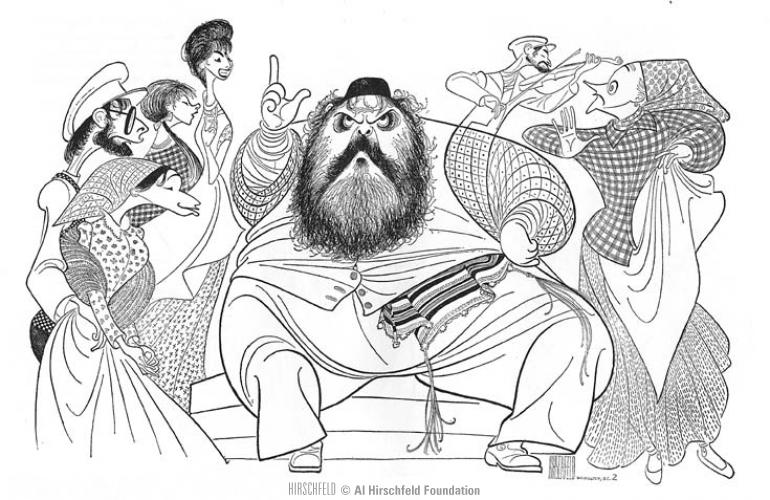
Cartoonist Al Hirscheld's famous drawing of Zero Mostel
as Tevye in Fiddler on the Roof
Whether spending the night with an Ethiopian princess and her doomed lover or an Empress in search of her shadow; a fatalistic gypsy girl or a suicidal young Japanese woman who had been knocked up by an American sailor, I constantly found ways to spend my evenings with people whose life challenges were far greater than my own.
As new artists took on familiar roles, I got to watch familiar faces like Violetta Valery fall in love and die through a different lens. One night, while watching a less-than-thrilling performance of Bizet's Carmen, I remember thinking "Would you just die already -- I have a chemistry exam tomorrow morning!"
Throughout it all, there was something alternately thrilling and soothing about watching an audience fill an auditorium, feeling the communal moment of anticipation as the house lights dimmed, and my concentration deepening as the curtain rose on lives far more interesting than my family's.
Stories were being told. Whether or not they were accompanied by music, I was there to listen and learn. As a result, I never felt a great sense of shame or humiliation about what was happening at home. Statistically, it had to be happening to other families as well.
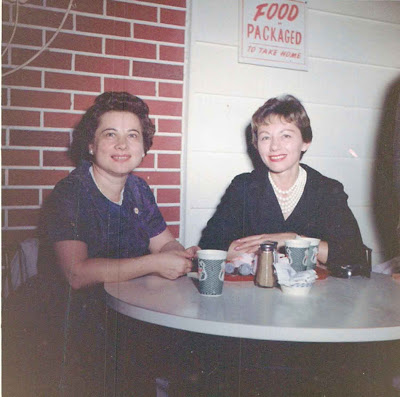
My mother (left) with Belle Kutner circa 1960.
A quarter century later, I had lunch with one of our neighbors from the 1960s, a dear friend who had occasionally tried to mediate a truce between my parents. "I'm amazed you can still talk to her" said Belle. My reply was devoid of emotion. "You only get one mother in life. And that one's mine."
Two theatrical productions new to the Bay area deal with the anguish and humiliation caused by darkly-held family secrets. Each packs its punches in highly effective ways. One, however, had a much greater intensity of audience appeal -- for obvious reasons.
* * * * * * * * * *
As I read the descriptions of the various shows to be performed at the 2013 San Francisco Fringe Festival, I was instantly intrigued by the title of Maria Grazia Affinito's monologue, Eating Pasta Off the Floor.

Maria Grazia Affinito stars in Eating Pasta Off The Floor
The narrative line of Eating Pasta Off The Floor follows Maria and her mother as they travel from Marin to the small town in Italy where her mother grew up. But the real drama lies in her mother's overly dramatic, highly combustible and often irrational behavior. Taking her mother shopping for groceries is far from fun whenever her mother starts trying to sell Maria to a favorite checkout clerk (or insists on scrounging for empty aluminum soda cans in each and every one of the trash receptacles in Safeway's parking lot).
Can her mother's erratic behavior be solely the result of a bitter divorce or are there deeper factors of dysfunctional behavior at play? Affinito's tragicomic descriptions of growing up in a tough Mexican-American neighborhood -- or having to explain to the police that she really does intend to kill her mother if and when the opportunity arises -- clearly demonstrate that while passions are intense in her family (imagine Anna Magnani with road rage), there are mysteries which no one has ever been able to explain. During their visit to an upscale Italian boutique, she gets a new insight into the many ways in which her mother has been mocked and scorned throughout her life.
As you can see from the above clip, Affinito is a powerful performer with plenty of poignant material. As she relates the story of her trip to Italy (ostensibly to visit Maria Libera's childhood friend, Assunta), she touches on stories of her mother's heroism during World War II.
Affinito slowly comes to realize that her mother must have been raped by a soldier. Suddenly, all of her mother's volatile behavior starts to make sense to the younger Affinito (who was raped in high school).
Affinito's unflinching performance hit all of its marks with a raw emotional power that was magnified when experienced in a tiny venue like the 50-seat EXIT Studio. While her show explored some very messy family problems, rest assured that spilled tomato sauce and pasta on the floor were the very least of them.
* * * * * * * * * *
In 1965, 19-year-old Liza Minnelli made her Broadway debut in a new musical with music by John Kander, lyrics by Fred Ebb and a book that was co-authored and directed by none other than the great George Abbott. While Flora the Red Menace had problems, it also made audiences nervous. Opening on Broadway barely a decade after Army lawyer Joseph N. Welch asked Senator Joseph McCarthy "At long last, have you left no sense of decency?" the new musical revived uncomfortable memories of the Hollywood Blacklist and how people's lives were ruined once it was revealed that they had the slightest bit of sympathy for the Communist party.
In the following clip, Mary Louise Wilson (who created the role of Comrade Ada in the original Broadway production) sings "The Flame" from a 1978 episode of Camera Three.
The Communist-style ideological purity depicted in Flora, The Red Menace now burns bright in America's Tea Party movement. Not only has it paralyzed the United States Congress, it has bitterly divided the American public. When environmentalists ask "What kind of world will we be leaving to our grandchildren?" they might be well advised to catch a performance of Amy Herzog's drama, After The Revolution (which was recently presented by the Aurora Theatre Company in Berkeley).
Something quite amazing happened as I sat in the auditorium waiting for the performance to begin. As the sound system played a collection of union and labor songs sung by Pete Seeger, members of the audience from multiple generations could be seen merrily singing along, reciting lyrics they probably hadn't sung in years. The play's protagonist, Emma Joseph (Jessica Bates), is an impassioned liberal who recently graduated from Columbia Law School.
- Currently employed as the Executive Director of the Joe Joseph Fund (named in honor of her late grandfather), she has been working to secure a new trial for Mumia Abu-Jamal, who is serving a life sentence for the murder of a Philadelphia policeman in 1981.
- Her elderly friend, Morty (Peter Kybart), has decided to donate $4 million to the Joe Joseph Fund instead of leaving the money to his children.
- Emma's 82-year-old grandmother Vera (Ellen Ratner) misses the political commitment that gripped her generation. Not only is she shocked at how little her grandchildren know or care about what is happening in the world, Vera still has a soft spot in her heart for Joseph Stalin.
- Emma's boyfriend (and new employee), Miguel (Adrian Anchondo), is a young minority lawyer deeply committed to fighting for social justice.
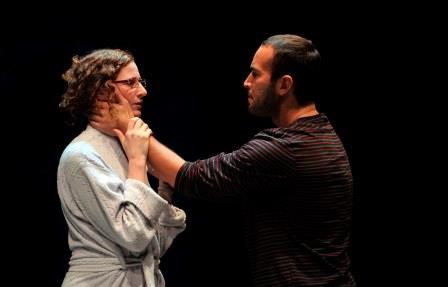
Emma (Jessica Bates) and Miguel (Adrian Anchando) in a
scene from After The Revolution (Photo by: David Allen)
Just when everything should be going great for Emma, her father (Rolf Saxon) and uncle Leo (Victor Talmadge) learn that a book which is about to be published names former federal employee Joe Joseph as a Communist spy who was passing government secrets to the Russians at about the same time that Julius and Ethel Rosenberg were executed.
Although Ben and Leo grasp the urgency of bringing Emma up to date on the breaking news, Ben (a high school teacher who remains a dedicated Marxist) has never been able to handle any kind of confrontation with his daughter. Even though Emma clearly remembers him instructing her to refer to her Walkman as a "Walkperson" when she was a teenager, Ben insists he did no such thing.
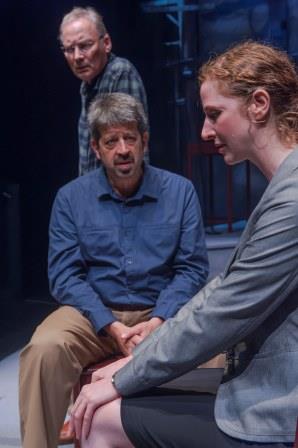
Leo (Victor Talmadage) and Ben (Rolf Saxon) break
the news to Emma (Jessica Bates) in a scene from
After The Revolution (Photo by: David Allen)
While the rest of the family, including Emma's older sister Jess (Sarah Mitchell), knew about Joe's history as a spy, this knowledge places Emma in an ethical dilemma.
- Should the shame of Joe's spying force her to resign from the Fund?
- Should she return Morty's invaluable donation?
- If she resigns her executive position, what will she do to support herself?
Emma's resentment at not having been let in on the family secret ends up leaving her feeling disgraced and paralyzed. Her inability to act responsibly causes Miguel to break up with her. Meanwhile, Jess (who has been in and out of drug rehabilitation programs) is suddenly basking in the glow of being "the good daughter." When Emma reads her letter of resignation to Grandma Vera, the old woman's reaction comes as quite a shock.
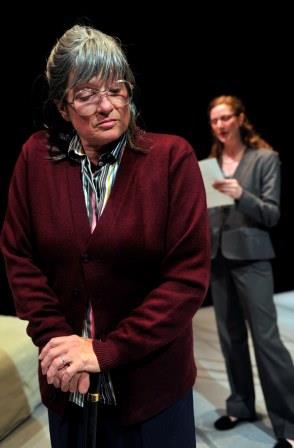
Vera (Ellen Ratner) listens to Emma (Jessica Bates) read her
letter of resignation in a scene from After The Revolution
(Photo by: David Allen)
While much of Herzog's writing is clever and generates solid laughs, one often feels that Emma's behavior is more self indulgent than might be justified by the situation. As her father, uncle, Morty, and Vera all try to explain that because Emma was not around in the 1930s, '40s and '50s, she can't really understand how things were, the audience starts to realize that Emma's narcissism is much less substantial than the risks her grandfather took while trying to raise a family.
Although Herzog's play was capably directed by Joy Carlin, I was surprised to find the most appealing performance coming from Sarah Mitchell as Emma's older sister, Jess. As Ben's wife, Pamela Gaye Walker shared a poignant telephone call with her daughter, Emma.
To read more of George Heymont go to My Cultural Landscape

